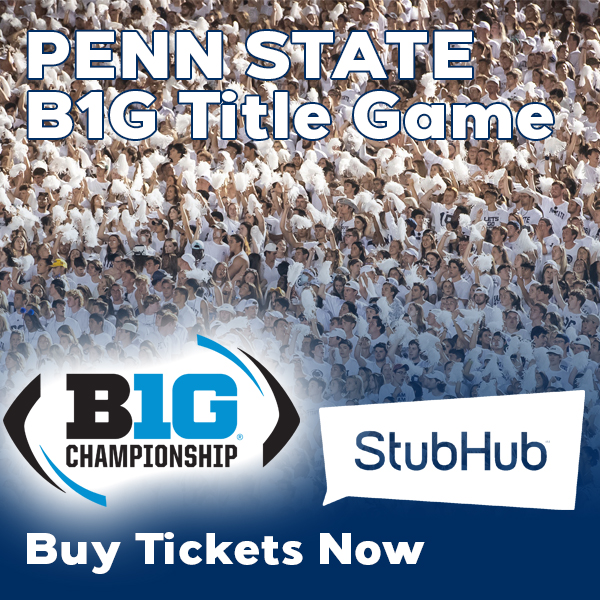Does Pennsylvania’s NIL Law Put Penn State at a Competitive Disadvantage?
In the Wild West of Modern College Athletics, Progressive Legislation Gov. Tom Wolf Signed into Law Last Summer to Benefit Student-Athletes Could Already Be Doing More Harm than Good for the Nittany Lions
Sponsor: Join our 2022 FTB Donors Club – the best way for you to show your support and keep this train rolling – and receive an exclusive FTB zipper bottle Koozie as a gift! Sign up HERE.
*Please remember to click the ‘Share My Address With For The Blogy’ box when checking out so we know where to mail your gift!
Politically speaking, Article XX-K of PA Senate Bill 381 – an amendment to the Public School Code that permitted college athletes to profit off their Name, Image, or Likeness (NIL) – was a slam dunk on a 7-foot rim.
On June 30, 2021, Pennsylvania became the 25th state to join the popular/mostly bipartisan movement of neutering one aspect of the NCAA’s draconian amateurism provisions when Gov. Tom Wolf’s signature assured Penn State athletes could partake in the same money-making opportunities as college players in other states that already passed NIL legislation. At the time, these various state NIL laws – many of which were scheduled to go into effect two days later – offered student-athletes protection from potential NCAA violations, a luxury that student-athletes in states without NIL laws didn’t possess…yet.
Two weeks later, Wolf figuratively spiked the football by holding a press conference inside Beaver Stadium’s Club Section where — surrounded by Penn State athletes, coaches, and administrators — he told the press, “This step toward fairness for athletes aligns with changes taking place in other states…It will also help to ensure that Pennsylvania colleges and universities remain competitive to future athletic prospects.”
Yeah, um, so about that, Tom…
Mere hours after Pennsylvania’s NIL law was signed, the NCAA adopted a completely toothless Interim NIL Policy that greenlighted marketing opportunities for ALL student-athletes regardless if their college was in a state with NIL laws or without NIL laws. That means, for instance, Penn State QB Sean Clifford could have endorsed McLanahan’s Meatball Subs even if PA lawmakers never got their NIL amendment passed. But because it DID pass, according to the NCAA, Clifford and Penn State, “can only engage in NIL activities consistent with the law of the state.”
And in at least one football-crazed state that authored its own NIL law, that’s a problem that needs fixing.
Can you guess which o…
ALABAMA!
Hmm, could have let me finish the question, but yeah it’s Alabama.
In fact, Alabama State Rep. Kyle South — the original sponsor of the House Bill that eventually became Alabama’s NIL law in April 2021 – is now sponsoring legislation that REPEALS his own NIL bill! Not amend. Not revise. Not restructure. REPEAL…as in blow it up and take it off the books completely. The reason? Well, according to Rep. South, Alabama’s NIL bill is “too restrictive” and therefore prevents SEC powerhouses Alabama and Auburn from partaking in the type of creative NIL tactics we’ve seen from their conference contemporaries.
Not surprisingly, Rep. South’s Repeal Bill received an endorsement from both Alabama and Auburn’s athletic departments. Also not surprisingly, South’s Repeal Bill passed in the Alabama House of Representatives by a 97-1 vote. It now awaits approval by the state senate. Spoiler Alert: they’re gonna pass it.
Like a true politician, South hasn’t concretely stated what portions of Alabama’s NIL law are “restrictive” but considering the only real rules in the NCAA’s current policy are that athletes must report NIL activities to their school and that colleges can’t use NIL as a ‘pay for play’ proposition, it could easily be argued that EVERY limitation in Alabama’s NIL law is too restrictive.
Same goes for Pennsylvania – because this state law exists, Penn State cannot solely adhere to the looser NCAA Interim Policy or abide by a university-created NIL policy.
But what specific prohibitions listed in PA’s law could be hindering Penn State’s NIL efforts?
Well, for starters, Pennsylvania’s NIL law includes language that establishes parameters – albeit ambiguous parameters — regarding how much student athletes may earn from their name, image, or likeness. Under Section 2003-K, Subsection A Compensation Allowed, the law reads, “A college student athlete may earn compensation for the use of the college student athlete’s name, image, or likeness under this article. The compensation shall be commensurate with the market value of the student athlete’s name, image, or likeness.”
For Penn State, the poison pill in that subsection might be the phrase “market value.” The same phrase appears in the State of Alabama’s NIL law, and likely is a reason why lawmakers and athletic departments want to get rid of it. Capping an athlete’s NIL earning potential at his/her market value theoretically restricts just how ambitious/generous/ridiculous third-party entities (businesses, boosters, non-profits) can be with student-athletes. Hypothetically, if a deep-pocketed business owner wanted to pay incoming 5-Star freshman QB Drew Allar an astronomical sum like $200,000 for a private autograph session, well, that could very well be a violation of Pennsylvania law. Or, it could be argued that if Penn State’s offensive linemen (usually the least marketable position group on a football team) were the beneficiaries of top-dollar NIL deals like the ones recently given to Texas’ offensive line through a newly-formed charity then that too might violate Pennsylvania law.
Well, who’s to say what a college athlete’s market value is?
Good question. There are data analytics companies with algorithms to calculate a college athlete’s market value based off factors like his/her social media following, social media engagement, the sport they play, where they play, the total revenue that sport generates, etc. Those valuations provide a ballpark figure for athletes, colleges, and businesses to consider when determining whether an NIL deal complies with state law.
According to PA’s NIL Law, student-athletes entering into an NIL agreement must disclose the details of that deal to university officials at least 7 days prior to the execution of that contract, meaning it’s ultimately Penn State’s decision how brazen it wants to be in stretching the boundaries of “market value.”
For NIL-obsessed schools like Texas and Texas A&M, the issue of “market value” isn’t an issue at all because that wording doesn’t appear in the State of Texas NIL law…at least not in the final version of the bill signed by Gov. Greg Abbott. We added that post-ellipses tail to the last sentence because (as you’ll see in the screenshot below) the introduced version of Texas Senate Bill 1385 (the first draft of the NIL law) DID include “fair market value” phrasing. Thankfully for the Aggies, Longhorns, and every other football-playing institution in the Lone Star State weaponizing NIL, lawmakers had the foresight to remove those three words before it was signed into law.
Section 2003-K of PA’s NIL law presents another potential roadblock for schools like Penn State. Subsection B of the law reads, “An Institution of Higher Learning may not arrange third-party compensation for a college student athlete relating to the use of the college student athlete’s name, image, or likeness rights or use a similar type of arrangement as an inducement to recruit a prospective college student athlete.”
The way that provision is written raises the question whether Penn State would be in violation of Pennsylvania law if it copycatted NIL initiatives recently announced by a pair of Big Ten rivals.
On Jan. 24, Ohio State’s athletic department launched its NIL EDGE TEAM, an internal advisory group that helps student-athletes attract NIL opportunities while working with companies and brands to assist in the NIL process. Furthermore, Ohio State will be assigning operation directors for all of its varsity sports to serve as “NIL Points-of-Contact” who will assist with facilitating a connection for NIL activity. Essentially, the EDGE TEAM and these sport-specific Points of Contact will serve as a bridge between athletes and companies.
The establishment of these in-house NIL entities at Ohio State marks a philosophical shift in how the Buckeyes approach this new, wild frontier of college athletics.
“Our guidelines were initially created to be restrictive, but now that we have a better understanding of NIL, it’s clear that we can provide more assistance in connecting student-athletes with interested brands,” senior associate AD Carey Hoyt said in a university press release. “By allowing some OSU staff to interact with the brands and to educate and answer questions, we can eliminate hesitancy from brands, and donors, who were concerned about breaking rules.”
Using university resources to help facilitate NIL opportunities for Ohio State athletes – essentially match-making players to businesses — does not violate Ohio Gov. Mike DeWine’s Executive Order 2021-10D, which legalized NIL in the state on June 28 of last year. In Pennsylvania, it is unclear and subject to legal interpretation whether such a university-sponsored program would violate the prohibition against arranging “third-party compensation for a college student athlete relating to the use of the college student athlete’s name, image, or likeness rights…”
Last week, Michigan State – an aggressive participant thus far in the new NIL movement – and tech company INFLNCR launched the MSU EXCHANGE, an online portal where student-athletes and prospective businesses can connect virtually to initialize, negotiate, and finalize NIL deals. Once a deal has been reached, MSU EXCHANGE allows businesses to direct deposit NIL payments to the student-athlete endorser.
Full disclosure: Penn State has also partnered with INFLNCR but not in this type of “virtual boardroom” manner. Penn State student-athletes can use INFLNCR for assistance in content distribution and strategic ways to elevate their brand on the INFLNCR app. From our research, the closest comparison to MSU EXCHANGE available to Penn State Student-Athletes is the website, www.happyvalleytalent.com, which is operated by The Chamber of Business & Industry of Centre County and The Happy Valley Adventure Club and not affiliated with the university.








Leave a Comment